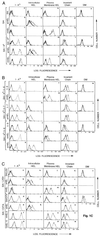Major histocompatibility complex class II-transfected tumor cells present endogenous antigen and are potent inducers of tumor-specific immunity
- PMID: 9192661
- PMCID: PMC21254
- DOI: 10.1073/pnas.94.13.6886
Major histocompatibility complex class II-transfected tumor cells present endogenous antigen and are potent inducers of tumor-specific immunity
Abstract
We have developed an immunotherapy in which tumor cells transfected with syngeneic major histocompatibility complex (MHC) class II genes are cell-based vaccines for the treatment of established tumor and metastatic disease. If this strategy is to be used clinically, convenient methods for generating class II+ tumor cells are necessary. Interferon-gamma treatment or transduction of the class II transactivator (CIITA) gene induces class II expression but also up-regulates the class II-associated accessory molecules, invariant chain (Ii) and DM. To determine if interferon-gamma treatment and CIITA transduction are potential immunotherapies, we assessed the tumorigenicity of sarcoma cells expressing combinations of class II, Ii, and DM. Since we hypothesized that class II-transfected tumor cells not coexpressing Ii and DM present endogenously encoded tumor peptides, we have assessed the transfectants for antigen presentation activity to MHC class II-restricted antigen-specific CD4(+) T cells. Tumor challenge studies demonstrate that tumor cells expressing class II without coexpression of Ii or Ii plus DM are highly immunogenic and preferentially present endogenous antigens, while tumors coexpressing class II with Ii or Ii plus DM are not effective immunogens. Because tumor rejection correlates with expression of class II without coexpression of Ii and DM, the most efficacious vaccines will express MHC class II without coexpression of Ii and DM and will preferentially present endogenous antigen.
Figures

Similar articles
-
MHC class II and CD80 tumor cell-based vaccines are potent activators of type 1 CD4+ T lymphocytes provided they do not coexpress invariant chain.Cancer Immunol Immunother. 2004 Jun;53(6):525-32. doi: 10.1007/s00262-003-0486-4. Epub 2004 Jan 17. Cancer Immunol Immunother. 2004. PMID: 14730400 Free PMC article.
-
MHC class II-transfected tumor cells directly present antigen to tumor-specific CD4+ T lymphocytes.J Immunol. 1998 Jan 15;160(2):661-6. J Immunol. 1998. PMID: 9551900
-
Tumor cells transduced with the MHC class II Transactivator and CD80 activate tumor-specific CD4+ T cells whether or not they are silenced for invariant chain.Cancer Res. 2006 Jan 15;66(2):1147-54. doi: 10.1158/0008-5472.CAN-05-2289. Cancer Res. 2006. PMID: 16424052
-
The role of MHC class II-restricted tumor antigens and CD4+ T cells in antitumor immunity.Trends Immunol. 2001 May;22(5):269-76. doi: 10.1016/s1471-4906(01)01896-8. Trends Immunol. 2001. PMID: 11323286 Review.
-
Cell-based vaccines for the stimulation of immunity to metastatic cancers.Immunol Rev. 1999 Aug;170:101-14. doi: 10.1111/j.1600-065x.1999.tb01332.x. Immunol Rev. 1999. PMID: 10566145 Review.
Cited by
-
Tumor immune escape in acute myeloid leukemia: Class II-associated invariant chain peptide expression as result of deficient antigen presentation.Oncoimmunology. 2012 Mar 1;1(2):211-213. doi: 10.4161/onci.1.2.18100. Oncoimmunology. 2012. PMID: 22720245 Free PMC article.
-
Promiscuous binding of invariant chain-derived CLIP peptide to distinct HLA-I molecules revealed in leukemic cells.PLoS One. 2012;7(4):e34649. doi: 10.1371/journal.pone.0034649. Epub 2012 Apr 26. PLoS One. 2012. PMID: 22563374 Free PMC article.
-
Expression of the MHC Class II Pathway in Triple-Negative Breast Cancer Tumor Cells Is Associated with a Good Prognosis and Infiltrating Lymphocytes.Cancer Immunol Res. 2016 May;4(5):390-9. doi: 10.1158/2326-6066.CIR-15-0243. Epub 2016 Mar 15. Cancer Immunol Res. 2016. PMID: 26980599 Free PMC article.
-
ANXA10 sensitizes microsatellite instability-high colorectal cancer to anti-PD-1 immunotherapy via assembly of HLA-DR dimers by regulating CD74.Cell Biol Toxicol. 2025 Jan 10;41(1):25. doi: 10.1007/s10565-024-09982-2. Cell Biol Toxicol. 2025. PMID: 39789407 Free PMC article.
-
Deciphering the interplay of HPV infection, MHC-II expression, and CXCL13+ CD4+ T cell activation in oropharyngeal cancer: implications for immunotherapy.Cancer Immunol Immunother. 2024 Aug 6;73(10):206. doi: 10.1007/s00262-024-03789-0. Cancer Immunol Immunother. 2024. PMID: 39105803 Free PMC article.
References
Publication types
MeSH terms
Substances
Grants and funding
LinkOut - more resources
Full Text Sources
Other Literature Sources
Molecular Biology Databases
Research Materials

